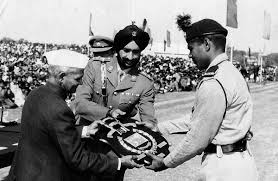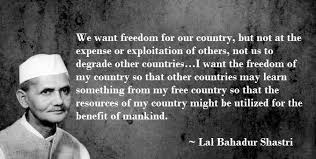By MILAN K SINHA

During last three days the country has been discussing the issue of barbaric act of Pakistani soldiers with regard to beheading the body of two Indian army personnel. Different views are being expressed by defence experts and Govt. functionaries to give a befitting reply to Pakistani establishment. Media channels are busy hosting such discussion to keep their viewers engaged and updated on this sensitive issue. Today, the country is remembering one of its great sons and the second prime minister of our country, Lal Bahadur Shastri on his 47th death anniversary who, for more than any thing else, is always remembered for his heroic leadership for teaching the real lesson to the then Pakistani rulers during India- Pakistan war of 1965. The Indian Nation needs leaders of such stature at this crucial juncture. Pl. see what Lal Bahadur Shastri said before 1965 war actually begun, "If Pakistan has any ideas of annexing any part of our territories by force, she should think afresh. I want to state categorically that force will be met with force and aggression against us will never be allowed to succeed." And India succeeded very conclusively to the great surprise of all the countries of the world including the super powers.

Development
During last three days the country has been discussing the issue of barbaric act of Pakistani soldiers with regard to beheading the body of two Indian army personnel. Different views are being expressed by defence experts and Govt. functionaries to give a befitting reply to Pakistani establishment. Media channels are busy hosting such discussion to keep their viewers engaged and updated on this sensitive issue. Today, the country is remembering one of its great sons and the second prime minister of our country, Lal Bahadur Shastri on his 47th death anniversary who, for more than any thing else, is always remembered for his heroic leadership for teaching the real lesson to the then Pakistani rulers during India- Pakistan war of 1965. The Indian Nation needs leaders of such stature at this crucial juncture. Pl. see what Lal Bahadur Shastri said before 1965 war actually begun, "If Pakistan has any ideas of annexing any part of our territories by force, she should think afresh. I want to state categorically that force will be met with force and aggression against us will never be allowed to succeed." And India succeeded very conclusively to the great surprise of all the countries of the world including the super powers.
Lal Bahadur Shastri was born on 2nd October, 1904 at Mugalsarai, near Varanasi. His father was a school teacher who died when Lal was only one year old. He spent his childhood in and around Varanasi. Lal Bahadur joined Kashi Vidya Peeth and studied philosophy for four years and was awarded the degree of Shastri in 1926. Thereafter he actively worked for "The Servants of the People Society", an organisation which was started by Lala Lajpat Rai. He participated in freedom movement and was jailed more than once. After the first general election in 1952 , he was inducted in union cabinet by Nehru as Minister of Railways and Transport. He did a lot to improve the facilities for passengers travelling in lower class and also rationalised the disparity between 1st class and 3rd class. Shastriji resigned from the post after a railway accident in Tamil Nadu on moral ground despite being persuaded by Nehru for continuing as Railway minister thereby setting a high moral standard in public life. In later years he handled the portfolio as minister of Transport & Communications , Minister of Commerce & Industry and in 1961 took over charge of Home ministry after the death of Govind Ballabh Pant. Lal Bahadur Shastri showed his calibre and competence during those trying times of Indo-China war in 1962 by managing the internal security.
After the sudden demise of Nehru, Lal Bahadur Shastri became the Prime Minister of the country. The time was very critical as the country was facing all kinds of challenges including shortage of food. But, as a man of strong will, dedication, commitment and integrity, he rose to the occasion like a true statesman and made us proud by addressing major issues of the country. Acknowledging and complementing the vital role of farmers and soldiers of the country, he coined the famous slogan JAI JAWAN, JAI KISAN. His views on some of the important issues as enumerated below give us the opportunity to know and appreciate his perspective and his action oriented personality:
After the sudden demise of Nehru, Lal Bahadur Shastri became the Prime Minister of the country. The time was very critical as the country was facing all kinds of challenges including shortage of food. But, as a man of strong will, dedication, commitment and integrity, he rose to the occasion like a true statesman and made us proud by addressing major issues of the country. Acknowledging and complementing the vital role of farmers and soldiers of the country, he coined the famous slogan JAI JAWAN, JAI KISAN. His views on some of the important issues as enumerated below give us the opportunity to know and appreciate his perspective and his action oriented personality:
Governance
“The basic idea of governance, as I see it, is to hold the society together so that it can develop and march towards certain goals. The task of the Government is to facilitate this evolution, this progress. It must provide proper conditions and a proper climate for this purpose. While governing, the administrator must, therefore, keep certain trends in view. He should be aware of the policies which he has to implement and of the methods which are open to him for their implementation. He should know what the Government wants and at the same time be attuned to the needs of the people”.
Development
“The economic issues are most vital for us and it is of the highest importance that we should fight our biggest enemies – Poverty, unemployment. Whether it is agriculture or industrial development, or for that matter, development in other fields, the basic fact remains – that it would serve the largest number of our people”.
National Integrity
“In this vast country of ours, people profess different religions, speak different languages, dress differently and observe different customs; but we are one nation; the history of our struggle for independence and our faith in our future development are our common bonds”.
“Among the major tasks before us none is of greater importance for our strength and stability than the task of building up the unity and solidarity of our people. Our country has often stood as a solid rock in the face of common danger and there is a deep underlying unity which runs like a golden thread through all our seeming diversity”
Will meet again with Open Mind. All the Best.

Short height but big thought. He was a great thinker, good motivator, dedicated person. He knew that country was facing shortage of foods and country was surrounded by wars. But he used his ability and motivated the country met by not using food at one time of the day and store the food. From this activity he united the country and boosted up the country met for future.
ReplyDeleteShastri's greatest moment came when he led India to victory in the 1965 Indo-Pak War. In his report to the Lok Sabha on the confrontation in Kutch, Shastri stated:
ReplyDeleteIn the utilization of our limited resources, we have always given primacy to plans and projects for economic development. It would, therefore, be obvious for anyone who is prepared to look at things objectively that India can have no possible interest in provoking border incidents or in building up an atmosphere of strife... In these circumstances, the duty of Government is quite clear and this duty will be discharged fully and effectively... We would prefer to live in poverty for as long as necessary but we shall not allow our freedom to be subverted.